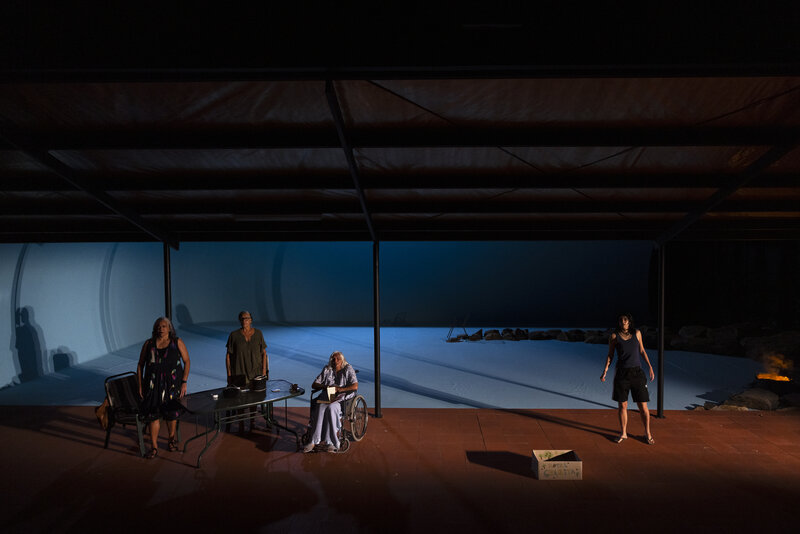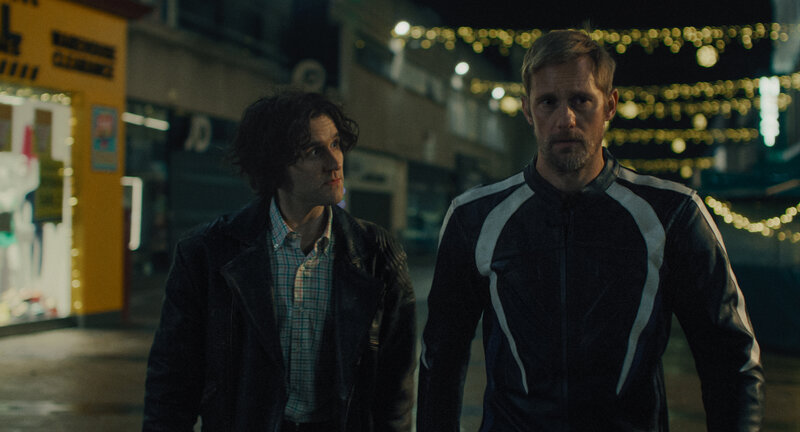A slow-moving but compelling drama set in the land of Lawrence of Arabia, this film’s origins are in Bedouin tradition. Theeb is specifically about a boy who, in order to survive, must become a man and live up to the name his father gave him.
 The year is 1916. While war rages in the Ottoman Empire, Hussein (Hussein Salameh Al-Sweilhiyeen) raises his younger brother Theeb (Jacir Eid Al-Hwietat) in a traditional Bedouin community that is isolated by the vast, unforgiving desert. The brothers’ quiet existence is suddenly interrupted when a British Army officer (Jack Fox) and his guide ask Hussein to escort them to a well located along the old pilgrimage route to Mecca. So as not to dishonour his recently deceased father, Hussein agrees to lead them on the long and treacherous journey. The young, inquisitive and mischievous Theeb secretly follows his brother, but the group soon finds itself trapped amidst threatening terrain riddled with Ottoman mercenaries, Arab revolutionaries and outcast Bedouin raiders.
The year is 1916. While war rages in the Ottoman Empire, Hussein (Hussein Salameh Al-Sweilhiyeen) raises his younger brother Theeb (Jacir Eid Al-Hwietat) in a traditional Bedouin community that is isolated by the vast, unforgiving desert. The brothers’ quiet existence is suddenly interrupted when a British Army officer (Jack Fox) and his guide ask Hussein to escort them to a well located along the old pilgrimage route to Mecca. So as not to dishonour his recently deceased father, Hussein agrees to lead them on the long and treacherous journey. The young, inquisitive and mischievous Theeb secretly follows his brother, but the group soon finds itself trapped amidst threatening terrain riddled with Ottoman mercenaries, Arab revolutionaries and outcast Bedouin raiders.
As co-writer and director Naji Abu Nowar explains, in Bedouin law if a stranger arrives at your tent requesting refuge you must grant him protection until the threat can be peacefully resolved. This is known as the law of Dakheel and it is considered a sacred duty no matter what the circumstance. Indeed, there are many stories of a host granting protection to his guest only to discover the Dakheel has killed a member of the host’s own family. But surprisingly this will not deter the host from his fulfilling his duty. A man’s reputation is defined by what he does in such difficult circumstances. The more impossible the situation, the more respect he receives for upholding the law.
Bedouin customs, like this, have grown from their environment, the desert. They are renowned for their generous hospitality because in the desert you must be able to rely on the kindness of strangers to survive. The terrain is too harsh, water and food too scarce for selfish behaviour. People need to help each other to ensure their mutual existence.
It was the combination of a culture of cooperation for survival and a Dakheel- type moral dilemma that helped formed the initial idea for Theeb. What would happen if you were stranded with your worst enemy but needed their help to stay alive? How would this relationship develop? To overcome such a merciless predicament, a person would have to develop incredible strength of character.
In Bedouin culture, a boy who endured such an ordeal would be called a Theeb (“Wolf”). If someone calls you a wolf, you have earned their respect as a man of daring and cunning, a person who can achieve seemingly impossible feats. The wolf is an ambiguous creature, revered and feared at the same time. It is both a pack animal, loyal to its tribe and a strong individual capable of existing by itself. So to be named Theeb at birth is to have the expectation of greatness placed upon you.
Nominated for Best Foreign Language Film at this year’s Oscars, this is the feature directorial debut for UK-born Naji Abu Nowar and it is certainly an auspicious beginning. While the basis of the story is a deep-seated precept, it is well told by Bedouins who hadn’t acted before. In fact, all cast members bar one were non-professionals.
The key, at least in the first instance, was finding a strong character to cast in the lead role and young Jacir Eid is a real find as Theeb. His deep, penetrating eyes and his ability to portray both vulnerability and strength with credibility were paramount. Interestingly, he is the son of the Bedouin contact the filmmakers had, merely sent along – in the first instance – to assist in any way he could. As soon as they gave him a camera test they knew he had something special by way of real screen presence. And Theeb’s older brother, Hussein, is portrayed by one of Jacir’s cousins, Hussein Salameh, who has a gentle way about him.
The film was shot in three locations in Jordan and the stark landscape is a feature. As a tale of pride and tradition set against the backdrop of change, Theeb should appeal to cinema purists. Rated M, it scores a 7½ out of 10.
Director: Naji Abu Nowar
Cast: Jacir Eid Al-Hwietat, Hussein Salameh Al-Sweilhiyeen, Hassan Mutlag Al-Maraiyeh
Release date: 25 February 2016 (limited)
Rating: M
Alex First

David Edwards is the former editor of The Blurb and a contributor on film and television




